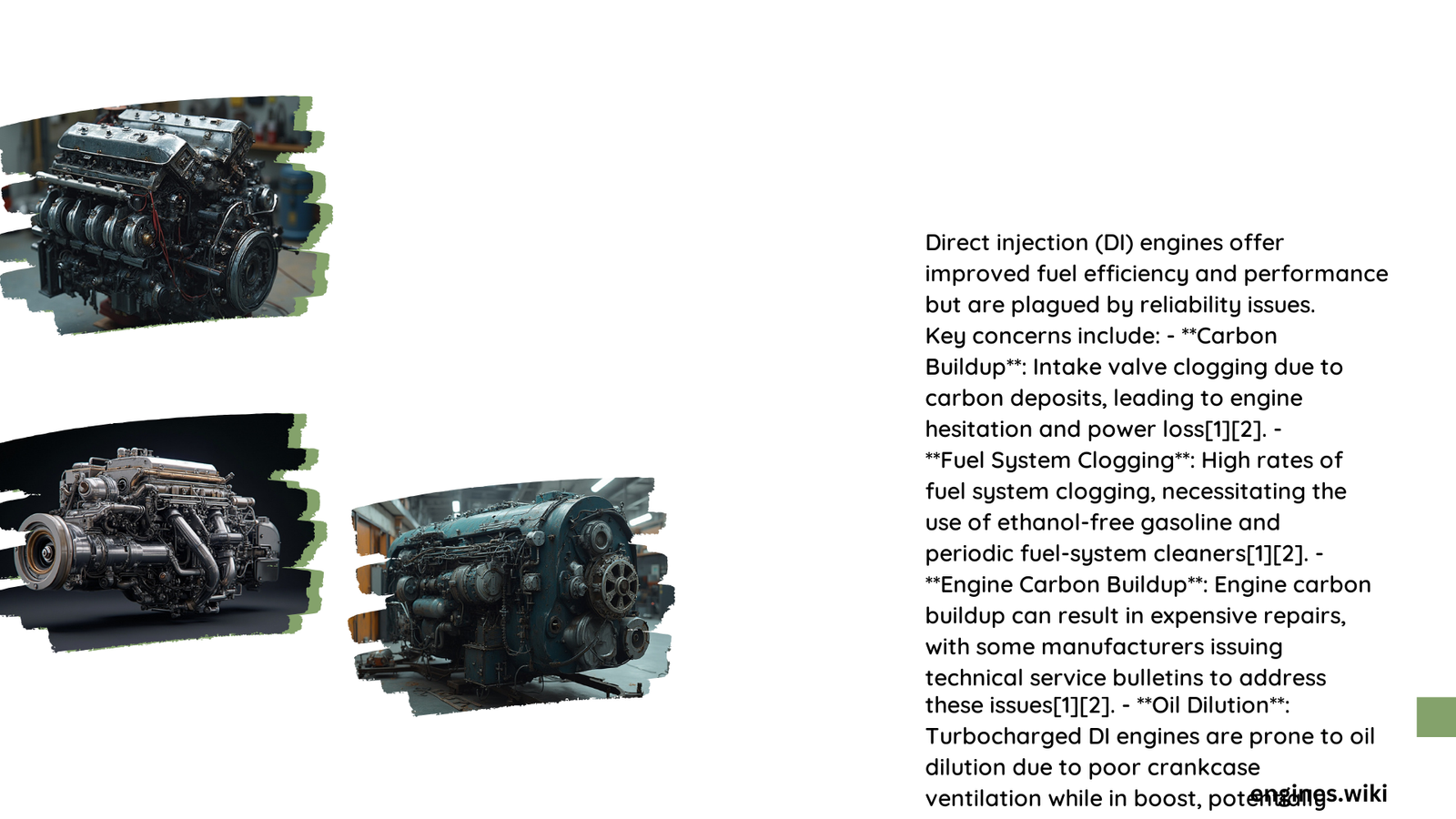Direct injection engine reliability has become a significant concern for many vehicle owners and manufacturers. These engines offer improved fuel efficiency and performance but come with unique challenges. Common issues include carbon buildup on intake valves, fuel system problems, and potential longevity concerns. Understanding these factors is crucial for maintaining and maximizing the lifespan of direct injection engines.
What Are the Specific Failure Rates of Direct Injection Engines?
Direct injection engines don’t have a single, universal failure rate. The reliability varies significantly based on the manufacturer, model, and maintenance practices. However, certain issues are more prevalent:
- Carbon buildup on intake valves
- Fuel injector failures
- High-pressure fuel pump malfunctions
For example, a study of 2010-2014 model year vehicles found that direct injection engines had a 15% higher rate of fuel system-related problems compared to port injection engines.
How Does Carbon Buildup Affect Direct Injection Engine Performance?

Carbon buildup is one of the most common issues affecting direct injection engine reliability. Here’s how it impacts performance:
- Power Loss: As carbon accumulates on intake valves, it restricts airflow into the combustion chamber, leading to decreased engine power.
- Fuel Efficiency Reduction: The restricted airflow can disrupt the air-fuel mixture, causing the engine to consume more fuel.
- Rough Idling: Carbon deposits can cause uneven combustion, resulting in a rough or unstable idle.
- Increased Emissions: Poor combustion due to carbon buildup can lead to higher emissions levels.
| Mileage | Typical Carbon Buildup Level | Potential Impact |
|---|---|---|
| 0-30,000 | Minimal | Little to no noticeable impact |
| 30,000-60,000 | Moderate | Slight power loss, minor efficiency decrease |
| 60,000-90,000 | Significant | Noticeable power loss, rough idle, decreased MPG |
| 90,000+ | Severe | Major performance issues, potential misfires |
What Are the Best Maintenance Practices for Direct Injection Engines?
To ensure optimal direct injection engine reliability, follow these maintenance practices:
-
Regular Oil Changes: Use high-quality synthetic oil and change it according to the manufacturer’s recommendations, typically every 5,000-7,500 miles.
-
Fuel System Cleaning: Use fuel system cleaners periodically, especially if you notice performance issues.
-
High-Quality Fuel: Use top-tier gasoline with detergent additives to help keep the fuel system clean.
-
Carbon Cleaning: Consider professional carbon cleaning services every 30,000-60,000 miles, depending on your driving habits and vehicle model.
-
Spark Plug Replacement: Replace spark plugs at the recommended intervals to maintain proper combustion.
-
Fuel Injector Inspection: Have fuel injectors inspected and cleaned if necessary during routine maintenance.
How Long Do Direct Injection Fuel Systems Typically Last?
The longevity of direct injection fuel systems can vary widely based on several factors:
- Maintenance Practices: Regular maintenance significantly extends system life.
- Driving Habits: Frequent short trips and stop-and-go driving can increase wear.
- Fuel Quality: Using low-quality fuel can lead to premature system failure.
On average, with proper maintenance, direct injection fuel systems can last 100,000-150,000 miles before major components may need replacement. However, some vehicles have reported issues as early as 60,000 miles, while others have surpassed 200,000 miles without significant problems.
What Are the Common Repair Costs for Direct Injection Engine Issues?
Understanding potential repair costs is crucial for assessing direct injection engine reliability:
- Carbon Cleaning: $300-$800
- Fuel Injector Replacement: $250-$1,500 per injector
- High-Pressure Fuel Pump Replacement: $800-$2,500
- Intake Valve Replacement: $1,000-$3,000 per cylinder
These costs can vary significantly based on the vehicle make and model, as well as labor rates in different regions.
How Do Manufacturers Address Direct Injection Engine Reliability Concerns?
Automakers have implemented various strategies to improve direct injection engine reliability:
-
Dual Injection Systems: Some manufacturers now use a combination of direct and port injection to reduce carbon buildup.
-
Improved Materials: Using more durable materials for components like fuel injectors and high-pressure pumps.
-
Software Updates: Engine management software updates to optimize fuel injection patterns and reduce carbon buildup.
-
Extended Warranties: Some manufacturers offer extended warranties on direct injection components to address reliability concerns.
-
Redesigned Components: Continuous improvement of fuel system components to enhance durability and performance.
By addressing these issues, manufacturers aim to improve overall direct injection engine reliability and customer satisfaction.
In conclusion, while direct injection engines offer significant benefits in terms of performance and efficiency, they do come with unique reliability challenges. Understanding these issues and following proper maintenance practices can help vehicle owners maximize the lifespan and reliability of their direct injection engines.
References:
1. Consumer Reports – Pros and Cons of Direct Injection Engines
2. GM Trucks Forum – Consumer Reports on Direct Injection Engine Reliability
3. Jeep Gladiator Forum – Discussion on Fuel System Issues
